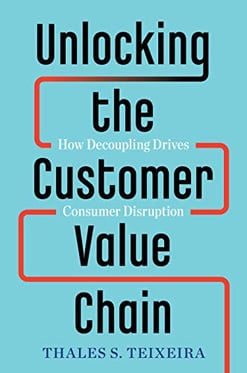 Companies can evolve and innovate.
Companies can evolve and innovate.
For innovation to occur, your people must possess the basic skills and resources, and want to do it.
Frequently, one or both are not present.
In Unlocking the Customer Value Chain: How Decoupling Drives Consumer Disruption, Thales Teixeira shares the obstacles company’s face to innovate, providing two examples of companies who successfully innovate consistently.
“Licking the Cookie”
What is “licking the cookie?”
Think back to grade school, a bully would steal cookies from kids and eat them. When a bully became too stuffed to eat more, they would grab cookies, lick them, and put them back, so other kids couldn’t eat them, either.
At Microsoft the practice of senior Windows or Office bosses annexing ideas from lower-level or less powerful managers was called just that.
Robbie Bach, former president of Microsoft’s Entertainment and Devices Division, who oversaw the company’s gaming, music, video, phone, and retail sales businesses for two decades, shared an instance when he had his cookie licked.
 “My group wanted to design a better media player, but the Windows team wanted its own media player. And so they got to design it. Do I think people were devious about it? No. People would let their ego get in the way of it. In that case, both groups lost. None was successful. This was all very detrimental to our customer. What happened? Apple won.”
“My group wanted to design a better media player, but the Windows team wanted its own media player. And so they got to design it. Do I think people were devious about it? No. People would let their ego get in the way of it. In that case, both groups lost. None was successful. This was all very detrimental to our customer. What happened? Apple won.”
Microsoft’s executives stopped making product launch decisions in customers’ best interest. Instead they made decisions to benefit themselves.
Decision-makers didn’t want to invest time, money, and reputation on highly uncertain and unproven ideas.
You face the same issues with your team. If you’re incentivizing your team on the current business model, they’re either too involved day-to-day achieve innovations, or they haven’t the interest to develop ideas outside their scope of work.
Companies Are Not Customer-Centric; People Are.
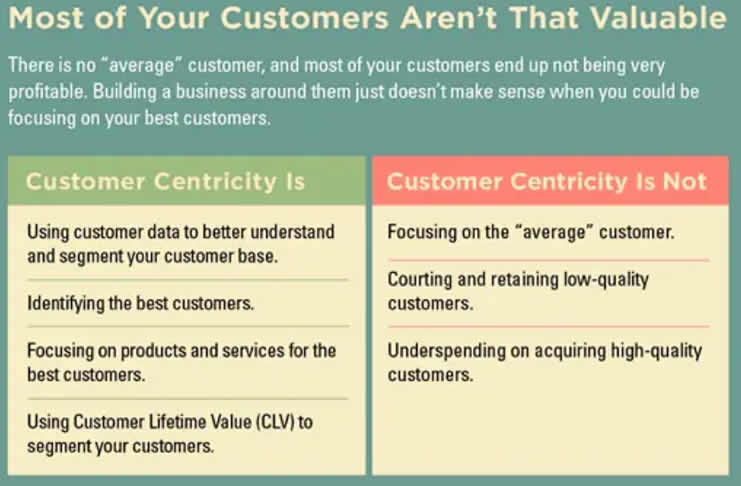
As Teixeira notes, even in the most innovative incumbents, resource-centricity tends to dominate, leaving the company vulnerable to growth stalls.
To promote customer’s evolving needs and wants, companies must place resources in employees’ possession. Opportunities to observe or connect with customers, intellectual approaches for understanding customers and responding to their demands, internal processes employees can deploy inside a company to work on behalf of customers, and finally, actual experience in dealing with customers promote employee innovation.
To tackle the issue of lack of incentives, your business must accept two approaches to realign employees’ priorities to customers’ needs.
First, change how employees earn financial recognition (salaries, bonuses) and promotions. Provide other kinds of incentives. That’s a significant challenge. Frequently no single executive controls compensation and promotion decisions. This requires a collective effort at the leadership level.
Second, change the people. Bring in executives and managers who are properly incentivized to put customers first.
Both options can work.
Here’s how Intuit achieves the first option.
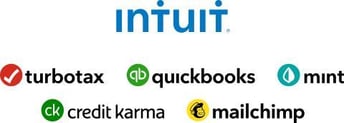 INTUIT
INTUIT
Software maker Intuit has a strong record of customer-centric innovation by carefully tailoring incentives. Intuit develops and sells financial, accounting, and tax preparation software such as TurboTax and QuickBooks. In 2017, its revenues, stood at $5.2 billion, and Q4 sales and annual operating income were both growing at 12 percent per year. In 2017, a consultancy ranked Intuit’s financial performance in the 99th percentile of public companies, with QuickBooks, claiming an 80 percent market share.
Intuit represents a unique case of a mature incumbent growing at near late-stage startup rates.
Cofounder and current board chairman Scott Cook imbued the company with a culture both uniquely innovative and focused on customers.
Cook nurtures innovation at Intuit by handsomely funding innovation. Intuit’s R&D spending as a percentage of revenues towered at 19 percent, higher than Google, Microsoft, Amazon, and Apple, which ranged from 4.7 percent (Apple) to 15.5% (Google).
Funding alone isn’t enough to overcome organizational change-killers hidden in most companies.
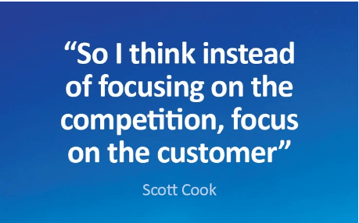 As Cook explained: “The solution we have found to work is to not allow managers to ‘play Caesar’ [voting on projects with a thumbs-up or thumbs-down] and substitute their approval for the results of customer-driven tests and experiments. Consumers drive what we develop further. So, the company knows we make decisions based on test results. We should honor the consumer test result, not the manager’s opinions”
As Cook explained: “The solution we have found to work is to not allow managers to ‘play Caesar’ [voting on projects with a thumbs-up or thumbs-down] and substitute their approval for the results of customer-driven tests and experiments. Consumers drive what we develop further. So, the company knows we make decisions based on test results. We should honor the consumer test result, not the manager’s opinions”
Intuit made it easier for employees to pursue customer-focused innovation by enabling employees to stay in close contact with customers.
The company regularly arranged for a small group of employees to experience “follow-me-homes” visits to customers’ homes or workplaces. There employees could observe customers opening the software product, installing it, and using it.
In 2011, a follow-me-home prompted software developer Hugh Molotsi to lead a small, internal, startup-like team to create Merchant Services, a credit card payment processor tool for small businesses to use with QuickBooks.
By 2017, employees were conducting about ten thousand hours of follow-me-homes each year.
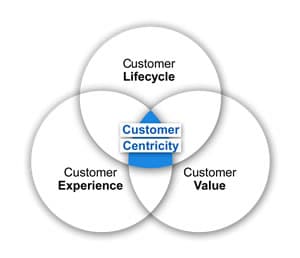 By incorporating financial incentives and making decisions based on results of customer testing instead of managerial judgment, Cook eliminated two major barriers that prevented thousands of junior-level employees at Intuit from coming up with new ideas.
By incorporating financial incentives and making decisions based on results of customer testing instead of managerial judgment, Cook eliminated two major barriers that prevented thousands of junior-level employees at Intuit from coming up with new ideas.
Changing the incentives for Intuit employees encouraged customer-centric innovation. Cook didn’t put a blanket system in place, but rather tailored incentives in response to employees’ varying needs and desires.
To create an environment where everyone is inspired to give their best, contact Positioning Systems today to schedule a free exploratory meeting.
Growth demands Strategic Discipline.
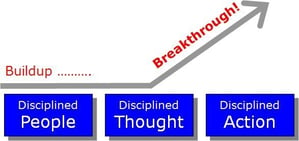 Talent Acquisition – Changing the people to drive innovation. Next blog we look at the second option for growing innovation, People, and the transformative Success story of print media company Axel Springer.
Talent Acquisition – Changing the people to drive innovation. Next blog we look at the second option for growing innovation, People, and the transformative Success story of print media company Axel Springer.
Building an enduring great organization requires disciplined people, disciplined thought, disciplined action, superior results, producing a distinctive impact on the world.
Discipline sustains momentum, over a long period of time, laying the foundations for lasting endurance.
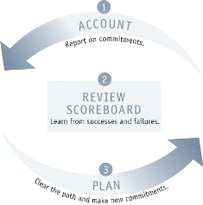 A winning habit starts with 3 Strategic Disciplines: Priority, Metrics, and Meeting Rhythms. Forecasting, accountability, individual, and team performance improve dramatically.
A winning habit starts with 3 Strategic Disciplines: Priority, Metrics, and Meeting Rhythms. Forecasting, accountability, individual, and team performance improve dramatically.
Meeting Rhythms achieve a disciplined focus on performance metrics to drive growth.
Let Positioning Systems help your business achieve these outcomes on the Four most Important Decisions your business faces:
|
DECISION |
RESULT/OUTCOME |
|
PEOPLE |
|
|
STRATEGY |
|
|
EXECUTION |
|
|
CASH |
|
Positioning Systems helps mid-sized ($5M - $250M+) businesses Scale-UP. We align your business to focus on Your One Thing! Contact dwick@positioningsystems.com to Scale Up your business! Take our Four Decisions Needs Assessment to discover how your business measures against other Scaled Up companies. We’ll contact you.
NEXT BLOG – Innovation Option 2 – Change the People






.jpeg?width=150&height=135&name=Hand%20with%20marker%20writing%20the%20question%20Whats%20Next_%20(1).jpeg)

